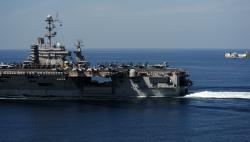By Harry Hutchinson, Labour Party, Northern Ireland
Tensions between the US and Iran have reached the point of military attacks that could yet evolve into full scale war. However, the US do not appear to have a clear strategy.
Trump cited possible collateral civilian deaths as the reason for the last minute calling off of ‘retaliatory’ attacks on missile and radar targets but this flies in the face of the fact of 80,000 starving civilians in Yemen, a situation directly caused by US sanctions as well as the estimated half a million who died as a result of US-backed conflict in the region.
The Trump administration are divided on military action. National security adviser Bolton, the planner behind the 2003 Iraq invasion, has pushed for all out war on Iran. However, Iran’s approach has caught Trump off guard. Firstly, there is the aggression Iran has shown by downing the US spy drone. Then, Iran has given the remaining signatories of the 2015 nuclear accord two months to oppose US sanctions and finally, there is Iran’s announcement that it will begin the process of enriching uranium nearer to weapons grade levels. Rouhani is ready to go on the offensive.
Trump ended the 2015 nuclear deal with Iran – also signed by Germany, France, UK, China and Russia, after Tehran began moving towards trading oil and gas in the euro and away from the petro-dollar, in April 2018. This was a risky move from Iran, as both Iraq and Libya found to their cost, having made a similar transition.
In fact, the nuclear deal had been adhered to by Iran. According to the International Atomic Energy Agency, Iran was complying and only developing civilian-use Uranium production.
Since the imposition of US sanction, the Iranian economy has plunged. Iranian oil production has fallen from 2.8m barrels per day in May 2018 to 0.5 bpd now. Inflation is soaring and the economy is in recession. European countries are reticent to help Iran out with financial assistance, fearing similar sanctions imposed on their countries as Trump has threatened to do.
Iran’s main military leverage lies with the flow of trade on the Strait of Hormuz, one of the world’s busiest waterways, with over 40% of the world’s oil passing through it. Oil-rich states like Saudi Arabia, UAE and Iraq depend on trade flowing freely through the Straits. A major escalation in this waterway could bump up oil prices and tip the world economy into recession.
As the US sends another 1000 soldiers to the region and announces more sanctions, the situation will become more tense. The US is hoping for internal strife in opposition to Rouhani, as sanctions create hunger and misery on Iranian civilians. The US is also backing an opposition group, Mujahedin-e Khalq, but the hawks in the White House, like John Bolton, want all-out war.
US policy has nothing to do with ‘democracy’ or ‘stability’ and everything to do with oil and strategic power, both for the US and its allies in the Gulf and Israel. US Corporations have for decades been trying to get access to Iran’s rich gas and oil reserves, which have been nationalised for almost 40 years.
Left Horizon and other socialists in the labour movement is opposed to US aggression in Iran. The Labour leadership need to make their voices heard, in opposition to US aggression in the region.
It remains to be seen what will happen in the coming weeks, but it should be noted that a war with Iran will not be an ‘easy’ option for the US, even with its military predominance in the region.
June 25, 2019



